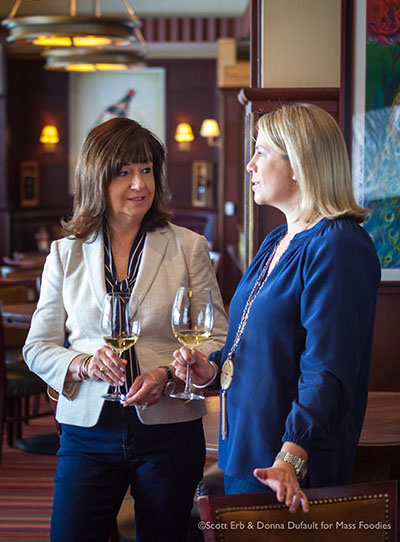Madeleine Ahlquist and Caitlyn Carolan Open Up About Worcester Restaurant Group
Mass Foodies
The women behind Worcester Restaurant Group are unusual.
For one thing, Caitlyn Carolan is never going to read this article. Despite the pressures of social media on modern business owners, she takes no pleasure in watching herself on camera or rehashing old interviews. She doesn’t mind skirting award ceremonies and staying off entrepreneurial lists. Her family measures success by longevity, not likes.
Carolan’s parents, Madeleine and Robb Ahlquist, share their eldest daughter’s love for privacy. An outward facing career in hospitality has that effect. As the architects of Worcester’s most revered restaurant group, the Alhlquists opened The Sole Proprietor nearly 40 years ago. That purchase gave way to the 111 Chop House and then VIA Italian Table, both on Shrewsbury Street.
Carolan has the poise of a débutante—she is polite, but never soft spoken.
“I get nervous because I’m shy, you know? But, if I describe myself that way, most people tell me I’m wrong,” she says, adding, “I guess it’s just how I perceive myself.”
Carolan remembers the early days at The Sole Proprietor, when she and her sister would spend Saturday afternoons setting out silverware for dinner service and eating sandwiches at the bar. When she got older, she and her teenage clique took up residence in a corner booth drinking Shirley Temples. Madeleine and Robb never minded giving her friends rides home; they’re the type of people who stay up late.
Even back then, Carolan was watching her parents with a careful eye. Some part of her always knew she’d end up in the family business.
On the occasion of the 111 Chop House’s 20th anniversary, Madeleine Ahlquist and her daughter agreed to sit down with Mass Foodies for a rare glimpse into WRG’s past. Does this willingness to open up indicate a shift in their PR philosophy? Probably not. But, their stories reminded us that if we’re too shy to ask we’ll never know.

Madeleine Ahlquist and Caitlyn Carolan of Worcester Restaurant Group
Putting Fish on the Plate
“It’s a challenge every day to keep the staff sharp and to keep the customers happy,” says Madeleine Ahlquist.
She is sitting in the palace that she built, awash in the hum of jazz music and surrounded by vintage works of art. The staff of the 111 Chop House readies for service, dressed in freshly pressed uniforms.
“I think it’s affordable,” she says, “But, there’s something about somebody showing up to your table in a white coat that feels like you’re walking into a restaurant in Chicago or New York.”
Ahlquist sees the 111 as more than a “special occasion” restaurant. “People come in and cannot believe our wine list; they’re often pleasantly surprised. They’ll plan parties and think the budget is going to be $1,000 to $2,000 more for a large party than it is, and it’s not,” she remarks.
These days, Ahlquist doesn’t work as much as she used to. “I spent a lot of time at VIA when it first opened 12 years ago; that was the toughest restaurant to open because everybody has their version of Italian food,” she remembers, “Their mother did this, their grandmother did that, and on Shrewsbury Street to boot. We really had to identify ourselves. It came out great, but it wasn’t without a lot of heart and without a lot of hard work.”
She likes to stay behind the scenes. “There can only really be one focal point in terms of who makes decisions,” she says, “But, we’re all a team. They’re going to have to pull me out of the restaurants kicking and screaming.”
When asked about her initial struggles as a restaurant owner, Ahlquist replies like a good business woman—optimistically.
“I’ll tell you what wasn’t a struggle,” she offers, “We had our seafood supplier right off the bat, we used the M.F. Foley Company; they’re very high-quality fish people. We still buy our fish from them today for all three restaurants.”
Behind every strong empire is a brilliant woman.
“My husband and I both went to Syracuse University where we met and lived. He ran a restaurant and I taught school. Through word of mouth and some of his family members, we found the location in Worcester,” Ahlquist explains.
Back then, the most appealing thing about Worcester for the couple was the absence of a dominant seafood restaurant. She remembers thinking, “There should be a seafood restaurant on every corner in Worcester and there wasn’t.”
Madeleine continued teaching while Robb scouted locations throughout Central Massachusetts.
“When the space on Highland Street came up, we applied for a small business loan, sold our house, and put a downpayment on the restaurant. That’s how we started,” she says.
Optimism aside, this was not without its struggles. For one thing, the Ahlquists had to convince people that putting fish on the plate was something to show up for in Worcester.
“The physical plant that we moved into wasn’t as beautiful as we wanted it to be and we just didn’t have the money to make it as wonderful as we had envisioned,” Ahlquist recalls. “We came from running a beautiful tavern in New York state with gorgeous antiques and all kinds of Stickley Furniture.”
The Ahlquists were not deterred. They knew enough to lead with their passion for hospitality and food.
“Concentrating on those two things was what kept us focused,” she says. “After three years we got a little more money and we survived the typical time when restaurants fail if they’re not going to make it.” The Sole gained momentum and the Ahlquists felt supported by Worcester’s community.
Now, the couple is on its fifth renovation of The Sole. “We like to make sure our environment matches our product,” Ahlquist says, “That’s really important to us.”
Tire Kickers
Ahlquist’s version of what came next doesn’t do justice to her hospitality empire. “We were tire kickers, so it took us a long time to open another place,” she says. The Sole Proprietor finally got a little sister after twenty years in business.
“We saw the building, which is actually VIA now, and we thought it was absolutely beautiful. We always wanted to open a steak restaurant and we thought we could put it in that location,” she remembers.
The space had been the woodworking unit for the Worcester Public Schools. “If anything had to be repaired or manufactured for the City of Worcester’s schools, it was done in that building,” says Ahlquist, adding, “On my first tour there was sawdust everywhere.” She sighs, “Oh, we loved that building, but it wasn’t ready.”
They constructed the 111 Chop House on an adjacent lot from the ground up. “Our designer Peter Nimitz built a very timeless environment, so there have been very few changes. It has stood the test of time for the last 20 years.”
General Manager Aaron Francisco has been with the 111 from the beginning. “I think the expectations that we have for ourselves have always been the same,” he says, “We’ve developed this operation on three basics: service, food, and environment.”
Francisco has spent a lot of time massaging the woodwork over the last two decades, smoothing out chips and scratches with his own two hands. He credits 111’s steadfast service to a unique pod system where each section is accompanied by two servers. “There aren’t many other restaurants that manage that way and we put a lot of attention to the tables, a lot of attention to the customers,” he says.
In hiring her staff, Ahlquist has always looked for people who she felt could do the job better than she could. “It’s heartwarming for me when I think you could take my job. That’s when I know you’re hired,” she says, “I think we should all strive for that, embracing those who are energetic, innovative, smart, and involved. It’s been magic for me.”
She notes that many of her contemporaries are off in Florida. “It’s not for me,” she says, “I just love being around as many people as I can. The younger the better.”
This brings to mind Carolan who spent 4 years in New York City working in the children’s clothing industry before returning to Worcester. Carolan is a graduate of Syracuse like her mother.
“The business part of her is strong,” Ahlquist says.
At first, she tried to talk her daughter out of joining the family business. “You’re going to start as a hostess and then you’re going to be a waitress,” Ahlquist told her. “We pushed her away as much as possible.”
Carolan was persistent.
“She’s a very organized mother of three who can certainly accomplish lots of things and she’s turned on by the idea of this business,” Ahlquist says. “She has surrounded herself with the same people we like to surround ourselves with because one person can not do this alone.”
“My mother is passionate and she has a strong intuition,” Carolan remarks. If it weren’t for her shy disposition, she might admit that this is a quality they share.
The Future of WRG
In many ways, WRG’s future is embedded in its past. Ahlquist and Carolan put a lot of effort into retaining strong staff members who can coach new hires.
Like Francisco, server Patty Newton began working at 111 Chop House when it first opened two decades ago. “We had she and her family here for dinner on the night of our 20th anniversary and we celebrated her,” Ahlquist says smiling proudly, “She’s also a school teacher.”
As a former teacher herself, Ahlquist places great value on education. Carolan knows this better than anyone.
“My job right now is to suck up as much information as I possibly can from my parents to make sure the way they envisioned their restaurants operating is the way they continue to operate in the future,” Carolan says, adding, “And to learn to make them better—if that’s even possible.”
Ahlquist believes that relevance does not hinge on a social media presence or a PR push. For the matriarch, a willingness to embrace learning among her staff, her customers, her family, and herself is the secret ingredient that will keep WRG relevant for decades to come. In this way, she is not just unusual, she is extraordinary.
